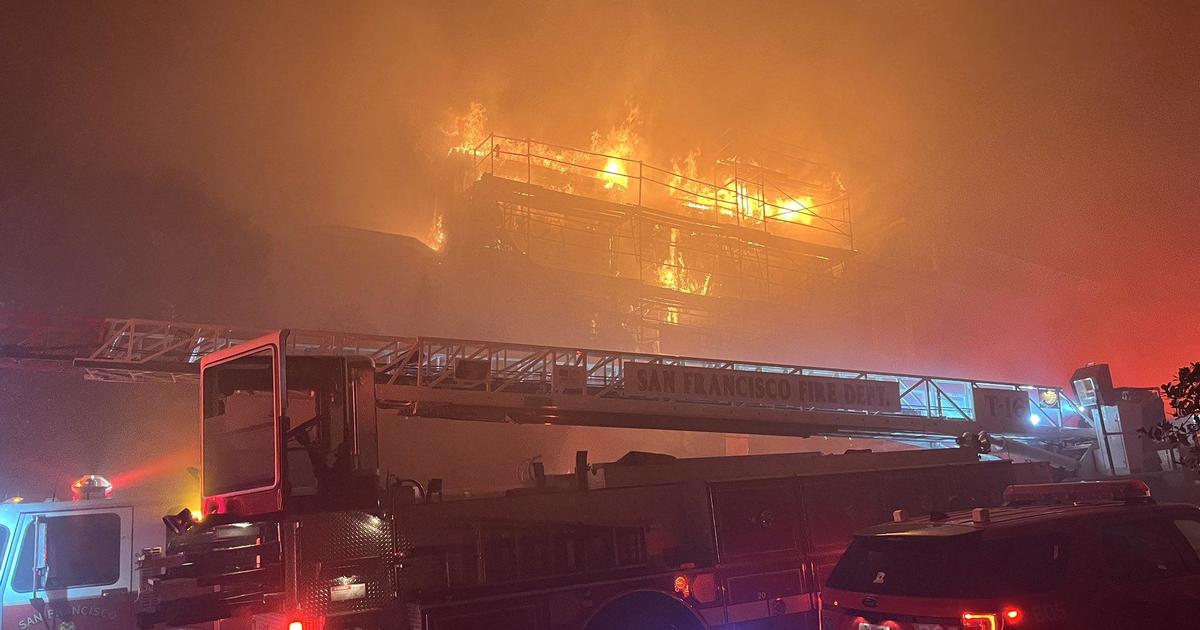Supreme Court Allows San Francisco, Oakland Lawsuits Against Big Oil Companies To Proceed
SAN FRANCISCO (CBS SF) – Two more ambitious lawsuits would be hard to image: in 2017 the cities of Oakland and San Francisco filed separate public nuisance lawsuits against five of the world's biggest energy companies, seeking to hold them responsible for the local effects of sea level rise.
On Monday, the U.S. Supreme Court declined to throw the suits out of court, although the cases still face many daunting obstacles ahead.
The theory of the cases is that through "massive production" of fossil fuels, the energy companies -- Chevron Corporation, BP LLC, ConocoPhillips, ExxonMobil Corporation and Royal Dutch Shell PLC -- have contributed to "global warming-induced sea level rise," which the cities have to spend enormous sums to abate.
According to the cities, the energy companies should fund a "climate change adaption program," which would include building sea walls and the other infrastructure needed because of climate change.
Asserting the claims "in the name of the people of the State of California," the suits were initially filed under state law in the Superior Courts of Alameda and San Francisco counties.
Not surprisingly, with billions of dollars at issue, the energy companies engaged some of the most prominent law firms and lawyers in the United States.
Among their first moves: get the cases out of state court.
In October 2017, the energy companies "removed" both of the cases from state court to U.S. District Court for the Northern District of California, where they were assigned to District Judge William Alsup.
Removal is a legal procedure made available to a defendant who is sued in state court when the basis of the claim is one that would support the jurisdiction of the federal courts, most importantly when the underlying claim is based on federal law.
The cities contested the removal, arguing that the public nuisance claims they asserted were quintessential state law claims, arising from the cities' power to protect their residents from harm caused by others. They pointed out that their complaints did not assert any federal law claims or seek relief under any federal statutes.
The energy companies invoked two exceptions to the usual rule that federal jurisdiction is determined solely by reference to the claims asserted in a plaintiff's complaint.
One exception applies when a federal issue is necessarily raised by the plaintiff's claim and the issue has "substantial importance" to the federal system as a whole. The other applies when federal law completely preempts state law.
In February 2018, Alsup found that the exceptions applied. In his view, sea level rise necessarily involved the national interests of the United States and directly implicated its relationships with foreign governments. Therefore, the suits should be determined under the uniform standard of federal common law.
Having found the case to be properly removed, Alsup then delivered a deadly blow to the cities. He ruled that there was no valid federal common law claim for public nuisance in a situation where nationally sensitive foreign affairs would necessarily be implicated.
Accordingly, in June 2018, Alsup dismissed the cases.
The cities appealed to the U.S. Court of Appeals for the 9th Circuit, which in August 2020 reversed the ruling. The court ruled that Alsup had been mistaken in concluding that federal law was of substantial importance to the claims.
In the appellate court's opinion, the issue of whether the energy companies "can be held liable for public nuisance ... and be required to spend billions of dollars on abatement is no doubt an important policy question, but it does not raise a substantial question of federal law."
The court, however, did not send the case back to state court.
The energy companies had asserted several other grounds for federal jurisdiction that Alsup had not considered given his conclusion that there was a federal common law basis for jurisdiction.
The court sent the case back to Alsup to consider those other arguments.
That effort was blocked, however, when the energy companies filed a petition asking the U.S. Supreme Court to reverse the 9th Circuit decision.
While that petition was pending, Alsup required the parties to brief the additional jurisdictional points, but he did not set a hearing and he did not rule.
On Monday, the Supreme Court declined to review the case, in effect freeing Alsup to schedule a hearing to consider the alternative jurisdictional arguments.
In sum, after years of litigation, the question of which court should hear these ambitious cases still remains very much undecided.
In a joint statement reflecting some frustration with the pace of proceedings, Barbara Parker and Dennis Herrera, the city attorneys of Oakland and San Francisco, respectively, said, "It's been nearly four years since we filed our suits, and it is now past time to move the cases forward on behalf of our residents and taxpayers to hold these fossil fuel companies accountable for their decades of deception and disinformation."
Braden Reddall, a spokesman for Chevron, said that the suits improperly seek to hold Chevron responsible for "worldwide conduct going back to the Industrial Revolution," and expressed optimism that the claims will be dismissed on the merits, regardless of whether they are heard in state or federal court.
© Copyright 2021 CBS Broadcasting Inc. and Bay City News Service. All Rights Reserved. This material may not be published, broadcast, rewritten or redistributed.



